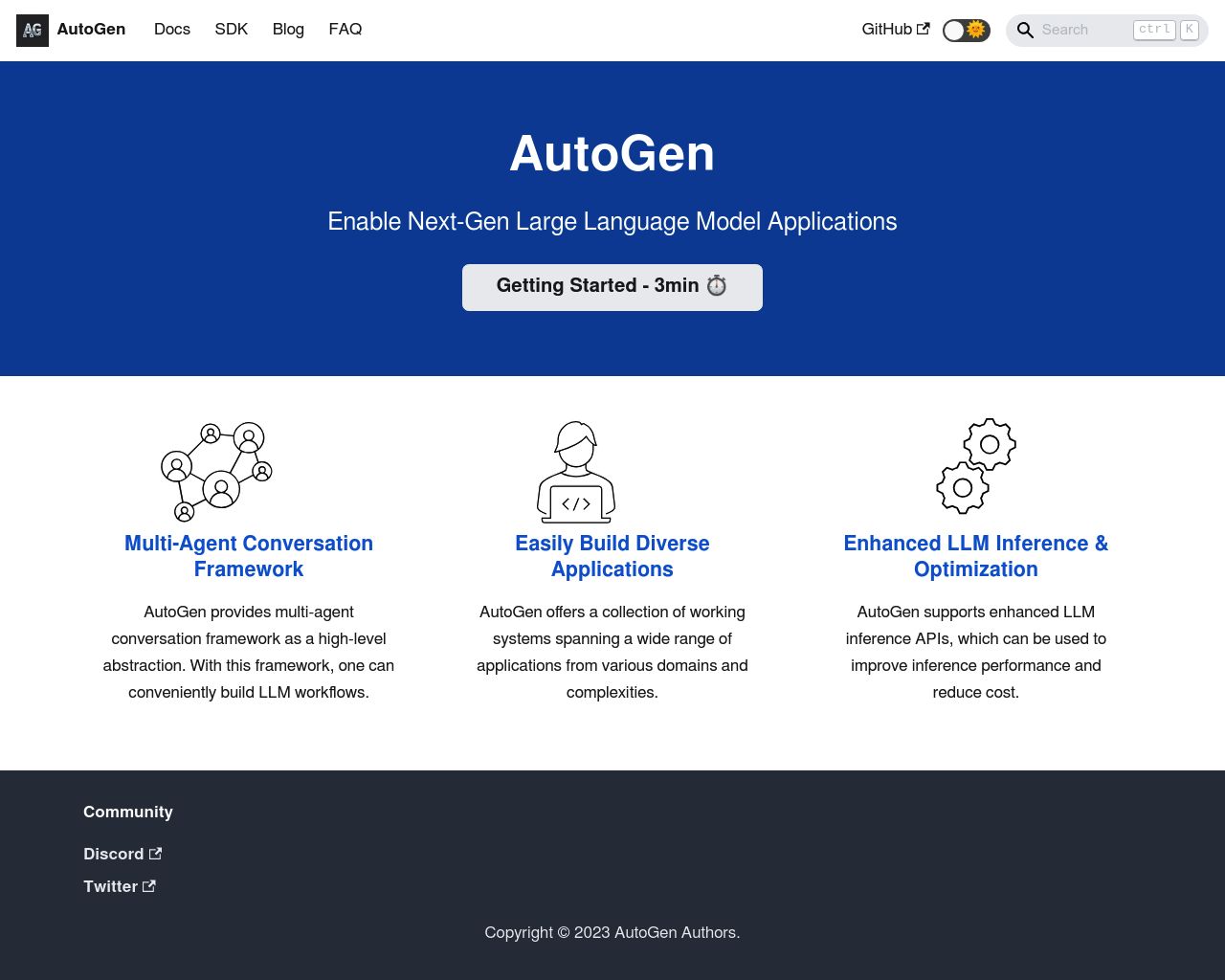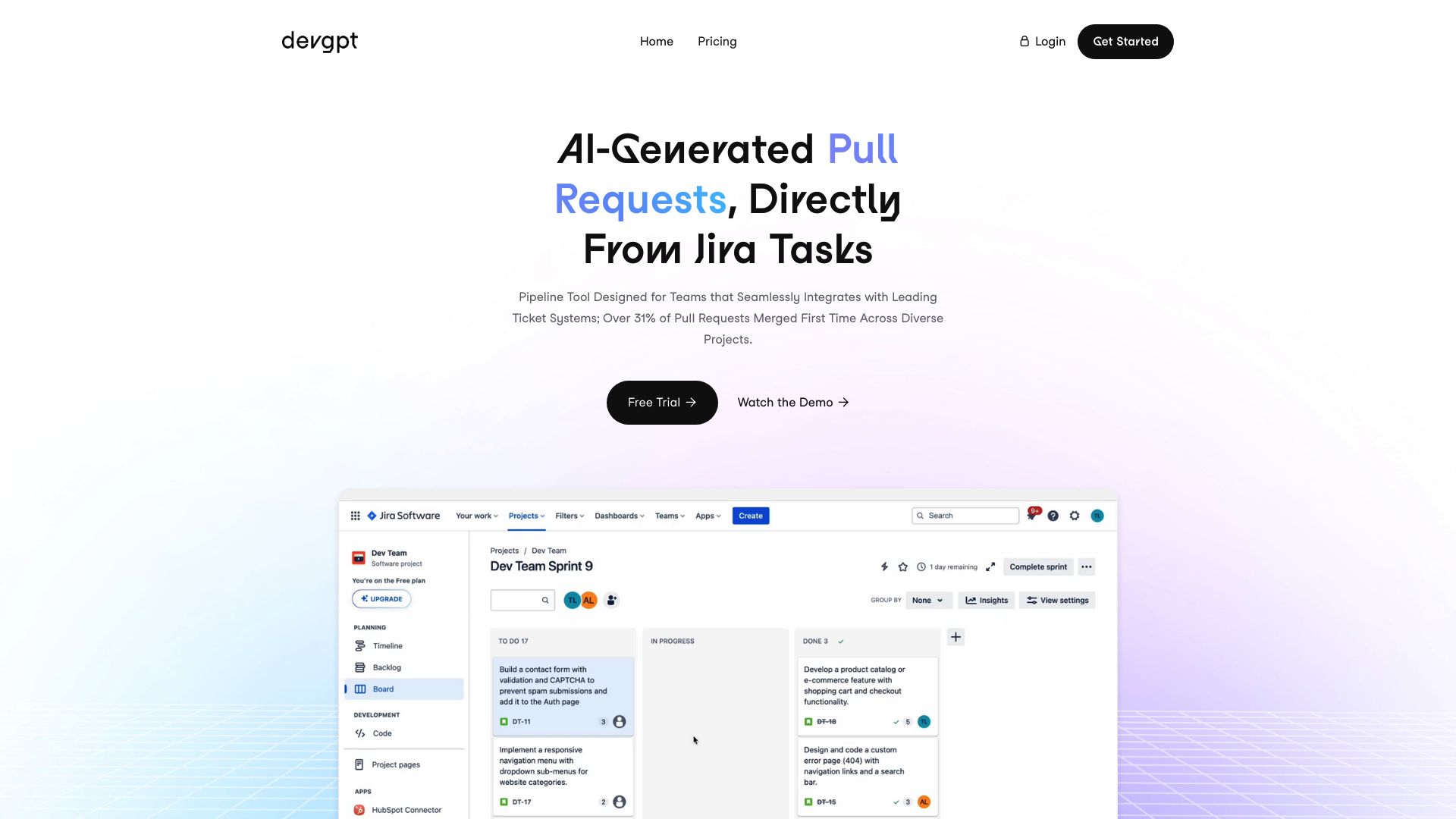AutoGen vs. DevGPT: Key Feature Comparison
Artificial intelligence development platforms empower businesses to harness cutting-edge technology for competitive advantage. This review compares AutoGen, DevGPT, and SmythOS — three leading solutions that streamline AI integration. We examine each platform’s core capabilities, ease of use, deployment options, and suitability for different user groups. Whether you’re a developer seeking flexible tools, a business leader exploring enterprise-grade solutions, or a non-technical user looking for accessible AI, this analysis provides key insights to guide your decision-making process. Discover how these platforms stack up in enabling efficient AI development, deployment, and management across diverse use cases and skill levels.
AutoGen Overview
AutoGen empowers developers to create sophisticated multi-agent AI applications. This open-source framework enables the orchestration of conversable AI agents that collaborate to solve complex tasks.


AutoGen’s strength lies in its flexible agent architecture. Developers can craft customized AI agents that leverage large language models, communicate with each other, and integrate external tools. This versatility supports a wide range of applications, from code generation to automated problem-solving.
AutoGen’s strength lies in its flexible agent architecture. Developers can craft customized AI agents that leverage large language models, communicate with each other, and integrate external tools.
The framework excels at maximizing the potential of foundation models like GPT-4. AutoGen provides enhanced inference capabilities, including features for tuning, caching, and error handling. This optimization allows developers to build more robust and efficient AI systems.
While AutoGen offers powerful capabilities, it requires coding expertise to fully utilize. The lack of a visual builder or no-code interface may present a barrier for non-technical users. However, for those with programming skills, AutoGen provides a flexible canvas for creating advanced AI agent ecosystems.
DevGPT Overview
DevGPT transforms natural language prompts into executable code, streamlining software development workflows. This AI assistant integrates with GitHub and Jira, automating pull request generation from tasks and tickets. DevGPT leverages advanced models like GPT-4 and Codex to power its code generation capabilities, catering primarily to individual developers and small teams.
The platform’s standout feature is its personalized training approach. DevGPT analyzes a developer’s existing codebase, learning their unique coding style to generate tailored snippets. Users can further refine the output through editable comments, ensuring the generated code aligns precisely with their needs. This personalization significantly boosts productivity, with early adopters reporting time savings exceeding 10 hours per week.
DevGPT analyzes a developer’s existing codebase, learning their unique coding style to generate tailored snippets… early adopters reporting time savings exceeding 10 hours per week.
DevGPT aims to become an indispensable AI-powered coding companion. While currently focused on serving individuals and small teams, the company envisions expanding its reach to organizations of all sizes. By fostering an engaged community of users and contributors, DevGPT seeks to drive continuous product evolution and cement its position in the AI-assisted development landscape.


DevGPT’s core premise centers on enhancing developer productivity by handling repetitive coding tasks. This allows developers to focus their efforts on tackling complex coding challenges. The platform’s integration with existing tools and ability to produce contextually relevant outputs tailored to specific teams set it apart in the competitive landscape of AI-assisted development tools.
While DevGPT offers impressive code generation capabilities, it lacks some features found in more comprehensive AI agent builders. The platform does not provide a visual builder or no-code editor, potentially limiting its accessibility for non-technical users. Additionally, DevGPT’s current focus on code generation may not fully address the needs of users seeking more diverse AI agent functionalities, such as natural language processing or data analysis.
Feature Comparison
AutoGen and DevGPT diverge significantly in their core components and security features. AutoGen provides a flexible framework for orchestrating multi-agent conversations and enhancing Large Language Model inference. Its strength lies in customizable, conversable agents that can collaborate autonomously or with human input. AutoGen supports persistent threads for memory and context management, enabling sophisticated problem-solving capabilities.
DevGPT, in contrast, focuses primarily on code generation from natural language prompts. While it excels at producing contextually relevant code snippets tailored to a developer’s style, it lacks the broader AI agent functionalities offered by AutoGen. DevGPT’s integration with GitHub and Jira streamlines development workflows, but it doesn’t match AutoGen’s versatility in creating diverse AI applications beyond coding tasks.
Regarding security, AutoGen offers more robust features, including OAuth support for API authentication and logging capabilities for auditing agent actions. DevGPT’s security measures appear more limited, focusing mainly on secure integration with existing development tools. This gap in security features may pose challenges for enterprises requiring comprehensive data protection and access control in their AI implementations.
Feature Comparison Table
| AutoGen | DevGPT | SmythOS | |
|---|---|---|---|
| CORE FEATURES | |||
| Hosted Agents (Dev, Production) | ✅ | ❌ | ✅ |
| Environments (Dev, Production) | ✅ | ❌ | ✅ |
| Visual Builder | ❌ | ❌ | ✅ |
| No-Code Options | ❌ | ❌ | ✅ |
| Autonomous Agents | ✅ | ❌ | ✅ |
| Explainability & Transparency | ✅ | ❌ | ✅ |
| Multimodal | ✅ | ❌ | ✅ |
| Multi-Agent Collaboration | ✅ | ❌ | ✅ |
| Audit Logs for Analytics | ✅ | ❌ | ✅ |
| Bulk Work | ✅ | ❌ | ✅ |
| Agent Work Scheduler | ❌ | ❌ | ✅ |
| Logs & Monitoring | ✅ | ❌ | ✅ |
| SECURITY | |||
| Constrained Alignment | ❌ | ❌ | ✅ |
| Data Encryption | ✅ | ❌ | ✅ |
| OAuth | ✅ | ❌ | ✅ |
| IP Control | ❌ | ❌ | ✅ |
| COMPONENTS | |||
| Foundation AIs | ✅ | ❌ | ✅ |
| Huggingface AIs | ✅ | ❌ | ✅ |
| Zapier APIs | ✅ | ❌ | ✅ |
| All other APIs, RPA | ✅ | ❌ | ✅ |
| Classifiers | ✅ | ❌ | ✅ |
| Logic | ✅ | ❌ | ✅ |
| Data Lakes | ❌ | ❌ | ✅ |
| DEPLOYMENT OPTIONS (EMBODIMENTS) | |||
| Deploy as API | ✅ | ❌ | ✅ |
| Deploy as Webhook | ✅ | ❌ | ✅ |
| Staging Domains | ❌ | ❌ | ✅ |
| Production Domains | ❌ | ❌ | ✅ |
| API Authentication (OAuth + Key) | ✅ | ❌ | ✅ |
| Deploy as Site Chat | ✅ | ❌ | ✅ |
| Deploy as Scheduled Agent | ❌ | ❌ | ✅ |
| Deploy as GPT | ✅ | ❌ | ✅ |
| Scalability | ✅ | ❌ | ✅ |
| DATA LAKE SUPPORT | |||
| Hosted Vector Database | ❌ | ❌ | ✅ |
| Sitemap Crawler | ❌ | ❌ | ✅ |
| YouTube Transcript Crawler | ❌ | ❌ | ✅ |
| URL Crawler | ✅ | ❌ | ✅ |
| PDF Support | ✅ | ❌ | ✅ |
| Word File Support | ✅ | ❌ | ✅ |
Conclusion
AutoGen, DevGPT, and SmythOS each offer unique approaches to AI-assisted development, but SmythOS emerges as the clear frontrunner for businesses seeking comprehensive AI solutions. AutoGen’s flexible multi-agent framework and DevGPT’s code generation capabilities address specific developer needs, yet both fall short in providing a complete ecosystem for AI deployment and management.
SmythOS distinguishes itself with its intuitive drag-and-drop interface, extensive integration options, and versatile deployment capabilities. Unlike AutoGen and DevGPT, SmythOS caters to both technical and non-technical users, democratizing AI development across organizations. Its support for over 300,000 integrations and compatibility with various AI models offer unparalleled flexibility and scalability.
While AutoGen and DevGPT excel in their niche areas, SmythOS provides a holistic platform that streamlines the entire AI workflow—from creation to deployment and management. This comprehensive approach, combined with features like multi-agent orchestration and pre-built templates, positions SmythOS as the ideal choice for businesses looking to leverage AI effectively across their operations.
To experience the transformative power of SmythOS for yourself, create a free account today. Explore our extensive library of AI agent templates to jumpstart your projects, and discover how SmythOS can revolutionize your approach to AI integration and automation. Don’t just adapt to the AI revolution—lead it with SmythOS.
Last updated:
Disclaimer: The information presented in this article is for general informational purposes only and is provided as is. While we strive to keep the content up-to-date and accurate, we make no representations or warranties of any kind, express or implied, about the completeness, accuracy, reliability, suitability, or availability of the information contained in this article.
Any reliance you place on such information is strictly at your own risk. We reserve the right to make additions, deletions, or modifications to the contents of this article at any time without prior notice.
In no event will we be liable for any loss or damage including without limitation, indirect or consequential loss or damage, or any loss or damage whatsoever arising from loss of data, profits, or any other loss not specified herein arising out of, or in connection with, the use of this article.
Despite our best efforts, this article may contain oversights, errors, or omissions. If you notice any inaccuracies or have concerns about the content, please report them through our content feedback form. Your input helps us maintain the quality and reliability of our information.
